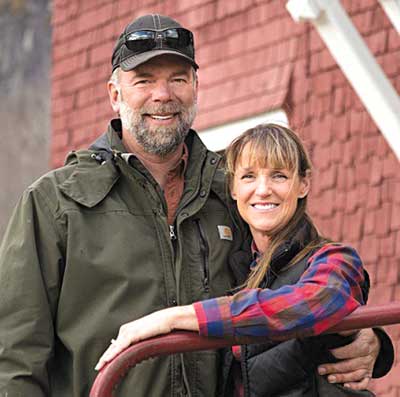 |
|
Dean and Deborah Richmond of Pleasant River Farms collect food waste from nearby Sunday River and Mt. Abram ski resorts and compost it along with their farm manure. Photo by Rachael Guay |
By Heather Omand
MOFGA Organic Marketing and Business Coordinator
The tourism industry brings billions of dollars into Maine, but that is not the industry’s only impact. The hospitality industry, a close compatriot to the tourism industry, generates a substantial amount of food waste. And nationally, approximately 30 to 40 percent of our total food supply is wasted.
In response to that issue, the United States has committed to halving food waste by 2030. To MOFGA-certified organic farmers Dean and Deborah Richmond of Pleasant River Farms in Mason Township, the whole situation smelled like a ripe opportunity.
Pleasant River Farms raises grass hay, pasture and grass-fed beef cows. It sells its meat to nearby restaurants, at the Bethel Farmers’ Market and to area health food stores.
The farm is near the Sunday River and Mt. Abram ski resorts in western Maine. Sunday River alone averaged 505,000 skier visits per year over the past five years. The Richmonds knew that these tourism centers in their local community generated a lot of food waste. As livestock farmers, they were already composting manure. Why not include materials from the local resorts?
The main challenges of adding food waste from a resort such as Sunday River were separating the food from the waste stream, transporting it, and receiving the permits necessary to do something with it. Pleasant River Farm overcame those challenges by becoming one of the Maine Department of Environmental Protection’s pilot programs to capture food waste before it ends up in landfills. Participating in the pilot program allowed the farmers to receive substantial technical expertise and guidance from the department.
As of October 2017, the Richmonds had collected and composted over 30,000 pounds of waste from the two local ski resorts. “Composting our cow manure, bedding and hay waste for field application is a regular part of our farm operation,” says Deborah. “Incorporating food waste from the area is a wonderful way to divert organics from the landfill and enriches the nutrient content of our compost. Pleasant River Farms is committed to emphasizing the growing awareness of food waste, its implications and solutions,” she continues. For their efforts, the Richmonds received the 2017 Composter of the Year award from the Maine Resource Recovery Association.
The Pleasant River farmers’ primary motivation was to “create an effective scalable process where food waste generated from seasonal tourism centers can be diverted from landfills and recycled back to local farms as soil amendments to grow more local food.” To implement their vision, they needed a suitable site with a USDA Natural Resources Conservation Service-approved compost pad, a permit and compost management plan through the Maine Department of Environmental Protection or Department of Conservation, Forestry and Agriculture, and the appropriate equipment (tractor, truck and manure spreader).
Their main challenges since implementing the project have been the costs of scaling up (processing the compost uses only 20 percent of their permitted capacity to receive food waste, but transporting the food waste in 50-gallon totes with their pickup truck takes the majority of their time and effort), the time and cost of transportation, and educating participating partners about the process needed to capture the organic waste stream. Yet both the farmers and the resorts are committed to their endeavors and to continuing to find creative solutions. These farmers say, “If we are to be a vital part of the food waste solution, it’s essential to find partners in the community to work with us.”
Pleasant River Farm’s bulk compost is approved by MOFGA for use in organic production. Contact the Richmonds at [email protected] or 207-595-6850.
